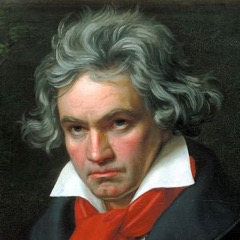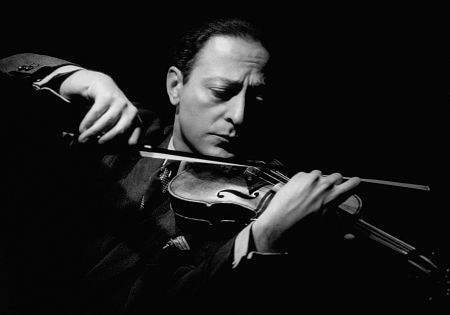Jascha Heifetz was born in Lithuania in 1901. At age 3 his father, who was also a violinist, began giving him violin lessons. For many years his father was very, very strict and very critical. He was soon enrolled in the local music academy.
The only non-music school he ever attended was the shul. Heifetz studied Hebrew to please his grandfather, who was a rabbi. At one time he could read Hebrew script.
At age 6 he performed the Mendelssohn concerto in public. Starting at age 7 he became the breadwinner for his family, who exploited him. As a child prodigy, Heifetz led a sheltered life and grew up on stage instead of among other children. He could do anything he wanted without interference from his parents as long as he practiced to their satisfaction.
When he wanted to play after practicing his mother always told him it was not good enough. This became so instilled in him that he told himself it was not good enough millions of times during his life while he practiced.
He said: “When I play a piece well I always hope that tomorrow I will play it even better.”
At age 9 he moved to St. Petersburg to study with Leopold Auer. There, Jews were confined to ghettos and had to ask for permission to stay within the city gates overnight.
In 1917 he made a phenomenally successful Carnegie Hall debut and went on to play in almost every major city in the world.
During World War 2 he gave hundreds and hundreds of concerts to the troops all over the world. Heifetz very, very rarely canceled performances. He was very professional about it unlike Horowitz.
He made several tours of Israel.
In 1928 he married Florence Vidor a silent film actress with whom he had two children. In 1947 he married Frances Spielberger with whom he had a son. They were divorced in 1962.
Heifetz was very self-critical. When he heard his own records he would invariably comment “too fast.” At age 20 as he became incredibly famous and successful, a music critic wrote about a lack of depth that had begun to creep into his playing. It was the first serious criticism he ever had encountered and it came as a terrible shock. The review thoroughly crushed him and he considered committing suicide. He later wrote the critic a letter of gratitude for bringing him to his senses. Heifetz wanted his playing to be exciting not just beautiful and he watched his audience for the slightest sign that their attention was starting to wane.
Heifetz said: “You have to be convinced that whatever you are playing is the greatest piece in the world.”
His near-perfect technique and conservative stage demeanor with a minimum of physical gestures created the illusion that his playing was cold. He was actually quite a passionate musician. In fact in his last years he sometimes cried when he made music with his assistant, becoming a little embarrassed about his emotional display.
By the 1960s Heifetz pretty much stopped concertizing and spent the last 25 years of his life teaching master classes in Los Angeles. His assistants for the master classes were required to help his students with their financial situations, housing, health problems, and any problems with the United States immigration service concerning student visas and their extensions. They had to help the students with clothing, better food, personal appearance and family problems so that the students could give total dedication to the master classes. The students were not allowed to take courses at the university. They were not allowed to have jobs playing in orchestras nor film studios. For those in financial need, he established two foundations, from which he distributed funds to them without fanfare.
Heifetz hated competitions and strictly forbade his students to enter them. “Why would you want to go to a competition? Who will be judging you? And what are THEIR qualifications?”
Heifetz began all his concerts with the thought that every performance happens only once. He taught that one should play each performance truly as if one’s life depended on it. If a student was too intellectual and delivered a calculated, cold performance, his favorite statement was “It was wonderful but I didn’t feel anything.”
He said “Try not to express your emotions through external means but convey them through your music and let the audience emote.” In a master class on the Finale of Tchaikovsky’s violin concerto Heifetz admonished the student to use more of the bow.
He said “I assure you that it takes the nerves of a bullfighter the digestion of a peasant the vitality of a night club hostess the tact of a diplomat and the concentration of a Tibetan monk to lead the strenuous life of a virtuoso.”
Heifetz had a very complex personality. If someone disagreed with him he interpreted it as a personal rejection.
Heifetz was active in the creation of the emergency telephone number 911.
In the 60s Heifetz became very concerned about the air pollution in L.A. So he got the idea of converting his car into a battery-driven car, which he spent a fortune on, designing and commissioning. It was the first passenger car like it on the West Coast. It was his contribution to fighting the smog, as he put it “so we can breathe the air, that I think we are entitled to”. It didn’t work too well though, so it remained in his garage!
His home in Beverly Hills was designed by Frank Lloyd Wright’s son. He also owned a beach house in Malibu. And as prices increased, he wrote the words “under protest” on the checks he wrote out for the utility and tax bills. And when his property taxes were increased he refused to pay them. He considered property taxes to be against the principles of the Constitution. City Hall put a lien on his property that eventually figured into the settlement of his estate.
Ayke Agus studied both violin and piano with Heifetz, was his assistant for the master classes, and in his last years served as his private accompanist and assistant. She wrote that he invited himself for dinner once or twice a week, dictated the time and sometimes the menu. He thought he had a natural gift for interior decorating and insisted that she and her husband should change their furniture around according to his specifications. With Heifetz no one was allowed to discuss politics, religion, nor music! She wrote that in the last years he was frequently depressed, that his mind created groundless suspicions and there were several incidents of near insanity.
He said: “I occasionally play works by contemporary composers for two reasons first to discourage the composer from writing anymore and second to remind myself how much I appreciate Beethoven.”
He made 150 transcriptions for violin and piano of short pieces which he liked to call “itsy bitsys”. Many of them were favorite encore pieces.
He died in 1987 when he was 86 from a blood clot on his brain followed by a stroke.
In his entire career, he only had 1 memory lapse. He was able to continue playing very well even in his 80s.
He was the highest-paid violinist of his time, and holds the Guinness Book of World Records for the largest-ever release devoted to the work of a single instrumentalist 103 CDs.

